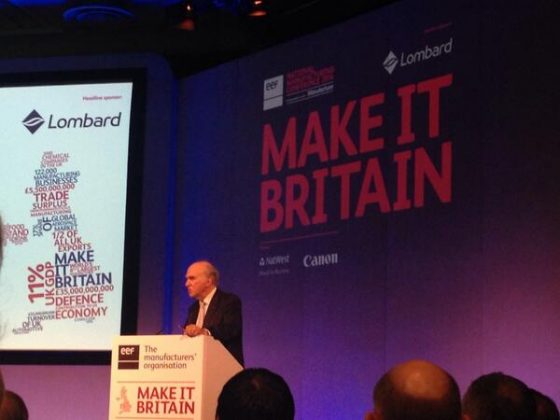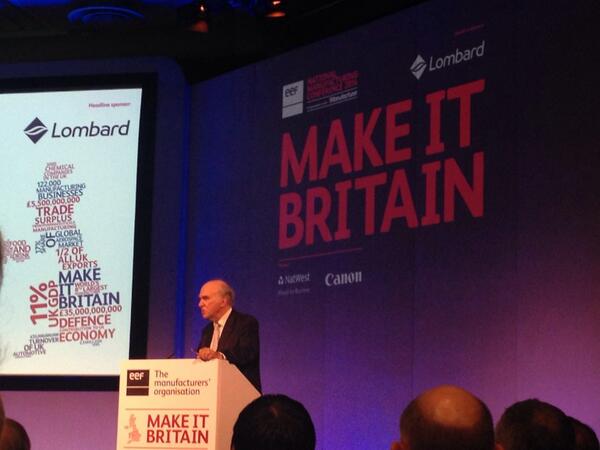Make it Britain 2014 conference – heat or light?
Posted on 06/03/2014 Category: General Martins Rubber blog

With the recent government drive on re-shoring to try and help companies bring work and jobs back to the UK, the EEF Make it Britain 2014 conference was always going to be relevant to us here at Martins. What we were interested to see was whether the recent high profile announcements of David Cameron and Vince Cable on the subject were simply “sound bites” or would actually result in tangible action from the top that in turn would filter down to us in the real economy. Given that there were also very credible manufacturing industry speakers on the platform, with a mixture of highly experienced and successful UK PLC CEO’s as well as SME leaders, it was clear the politicians on show could not count on an uncontested ride. Nigel Stein, the CEO of GKN was particularly interesting in making it clear how a simplification of the GKN business over the last 15 years by divestment and focus on the core business and its systems had hugely improved performance for a company that bases itself wherever its customers need it to be. The point he made to politicians was striking and chimes with our experience – please let’s have fewer initiatives and instead, just concentrate on a smaller number of key policies that are world class, well targeted, and make sure they are delivered efficiently at the point of need. The sometimes bewildering number of Quangos and funding options available often mean that it’s a full time job applying for and administering any project, even for a PLC, let alone a small SME like us. Strikingly, Nigel quoted Ronald Reagan’s advice to his then civil servants “Don’t just do something – stand there”. You do get the feeling that the top of politics does have an inherent need to be seen to “do something” when the better option might be to stand back and facilitate what is already meant to be done. The inimitable Lee Hopley, Chief Economist of the EEF, took part in a lively Q&A session on re-shoring and made the very valid point that as yet there is still a massive net off-shoring trade deficit despite the return of some significant work. Interestingly, Germany off-shores more than the UK does, with their trend actually increasing. Having had a wide ranging discussion on all aspects of the topic, a series of questions were posed to the audience to vote on, including “Do you wish we were more like Germany”, which got a very positive score. The net result however was that the conference was still unconvinced that the Re-shoring trend would actually deliver the opportunity of meeting the government’s stated aim of doubling manufacturing activity in the UK by 2020 to re-balance the economy. The afternoon session featured sessions on Exporting and how UKTI can help, again with business leaders on a Q&A panel to give insight to their experiences. Crispin Simon, MD of UKTI, was very committed in his explanation of the sea change in government policy delivered by the coalition government. The directive that our embassies overseas now have as their prime aim is the development of trade and business contacts, rather than the more traditional geopolitical aspects of their work. This was reinforced later in the day by Rt HON Ken Clarke QC MP, the Minister without Portfolio, who was again very explicit that one of his key aims is trade development in Medical and Life sciences and the O&G sector, where Britain has expertise that is valued the word over, and should be capitalised on. In many ways however the most relevant speaker was Vince Cable, minister for the Department of Business, Innovation and Skills. He delivered a wide ranging speech in which he outlined the work he and the government have done to actually deliver real progress. He outlined some of his frustrations with the slow pace of delivery, but gained the biggest round of applause all day when he said that one of the problems which needs to be overcome is that because “teachers know absolutely nothing about the world of work” they do not value or encourage pupils to enter skill based careers by means of apprenticeships. While this candid remark was no doubt inadvertent and will cause controversy in the teaching profession, the fact that it clearly struck a chord with so many in the audience who are actually out there trying to find suitable employees in the real world, said a lot. The Rt HON Dr. Cable MP was, however, very clear in responding to business concerns about lack of continuity from government and stated that he does in fact discuss Industrial Strategy not only within government but also with the opposition. He believes that with the country not even having had an Industrial Strategy for many years until the Coalition implemented one, it has been to our undoubted detriment and allowed facile claims to be made over recent times that thanks to the City, we no longer needed our farming or manufacturing industries as we could simply buy everything. He said that there is now broad cross party consensus that the current direction is correct and will need to run for far longer than the current parliament. He agreed with the heartfelt comments of business leaders that the uncertainty surrounding the UK’s membership of the EU, policies such as Labour’s draconian plans for the energy market, and Scottish devolution etc were all bad for investment in the UK. He said that by being less “tribal” as he put it, and talking to all the political parties, he was being responsible to the country as a whole in trying to seek consensus and continuity for the future. Once again however, an audience poll for the afternoon session again showed a large degree of ambivalence as to whether the detailed policy initiatives that had been showcased and explained were actually going to make a real difference on the front line. So, despite some very interesting dialogue with exceptionally well qualified and influential people, along with the chance to ask very direct questions to our political leaders, it was far from clear that the conference members came away with greater confidence that government action was timely and effective, or going to make a real difference on the front line. Walking back through Parliament Square and the thousands of tourists taking pictures of themselves beside Big Ben (or more accurately The Elizabeth Tower) and looking out for newscasters making their evening TV News reports, it was easy to see how the “Westminster bubble” of Parliament and Whitehall can be so disconnected from the reality of peoples’ lives and business. Once the politicians had stepped off the conference stage to deal once more with all their behind-the-scenes problems with managing huge departments of civil servants, trying to push them in a given direction, dealing with budgets, political allies & foes, and considering how to get re-elected next time to even have the chance to continue their work, perhaps it is not surprising that all this heat does not result in much real light at times. Having said that, by staging the EEF Make it Britain 2014 conference at least there was the chance to listen to, question and lobby the right politicians to try and influence the direction of travel and delivery for the better, and that at the very least is something that cannot be taken for granted in many countries around the world.
The post Make it Britain 2014 conference – heat or light? appeared first on Martin's Rubber Company.



